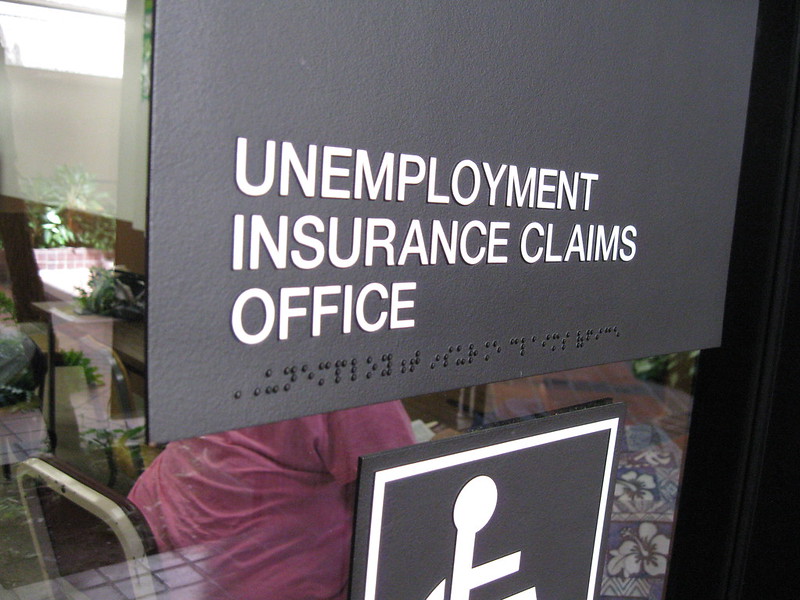Pandemic Jobless Benefits Meant ‘Less Stress.’
An average worker talks about importance of pandemic benefits for unemployed.

Unemployment Insurance Claims Office. Photo by Bytemarks (CC-BY).
Elected officials fought over two critical parts of Wisconsin’s Unemployment Insurance (UI) program: Should the jobless be required to apply for four jobs per week to get benefits? Is it time to end the additional $300 per week federal benefit, added to state benefits, because of the pandemic?
Time to hear from someone who has fought so hard to stay in Wisconsin’s middle class over almost two years that he doesn’t have time to follow the Capitol machinations of Republicans and Democrats
Why ask Mac to talk about his experience with UI benefits? Because, in less than two years, he:
-Was fired at a company where he had worked for more than 15 years. It was fall 2019 – pre-pandemic – so he qualified for the maximum state UI benefit of $370 per week until he found his next job.
-Was hired and laid off twice by another manufacturer after its sales evaporated because of the pandemic. He was laid off in April 2020, rehired in August, and laid off again in November.
-Quit a third job in April after he was scheduled to work five 12-hour shifts in a row. In his late-40s, his body couldn’t withstand being on his feet for 12 hours a day for five days straight.
-Is weeks into a new job for a fourth manufacturing company, thankful for a first shift that starts at 7 a.m.
Mac, there were hundreds of thousands of claims for UI benefits last year that crashed state government computers, delaying payments for months. Did you have that problem?
“I immediately started receiving benefits,” he says.
For part of last year, you qualified for the additional $600 weekly federal pandemic jobless benefit, in addition to the state maximum of $370. Did those two benefits total more than you had been making before you were laid off?
“It was very, very close. It might have been slightly more.”
But you never considered not looking for your next job. What did having that additional $600 in weekly benefits from the federal government mean to you?
“I was just happy to pay the bills, and not feel stressed about it…
“It gave me a freedom to choose a better-paying job – more freedom to be picky. There’s a lot of jobs out there that pay less that are available. But to make what I had been making — pre-Covid — I had to be a bit more selective.”
What would it have meant, if you had not received that additional $600 federal benefit?
“I would have had to find something, to pay the mortgage – a less desirable job.”
“I think it’s achievable, but I think you need to be selective in your applications. You could very well get a job offer that is not to the pay you would like. And then the State of Wisconsin requires you to take that, basically, or stop receiving benefits.”
There’s also debate over ending the additional $300 per week federal pandemic benefit? Do you think it should end?
“I don’t think that [$300 per week] should be indefinite. I think it should depend on what you were making before Covid hit. If you were making less, why should you receive more in unemployment than what you were making before? That, I think, is where it would motivate people not to get a job. They don’t want to make less.”
So, you did not have a problem getting state and federal UI benefits during the pandemic and they helped your family get through it?
“We never missed a mortgage payment, which is big.
“But I also think that has to do with having finances in order before Covid hit. We didn’t have a car payment before Covid, didn’t have to worry about that. In fact, we were able to save. You’re not driving anywhere. You’re not going out to eat. You make choices.”
Steven Walters has covered the Capitol since 1988. Contact him at stevenscotwalters@gmail.com
If you think stories like this are important, become a member of Urban Milwaukee and help support real, independent journalism. Plus you get some cool added benefits.
The State of Politics
-
A Wisconsin Political Trivia Quiz
 Dec 15th, 2025 by Steven Walters
Dec 15th, 2025 by Steven Walters
-
The Fight Over Wisconsin’s House Districts
 Dec 8th, 2025 by Steven Walters
Dec 8th, 2025 by Steven Walters
-
The Battle Over On-Line Betting
 Nov 24th, 2025 by Steven Walters
Nov 24th, 2025 by Steven Walters





















